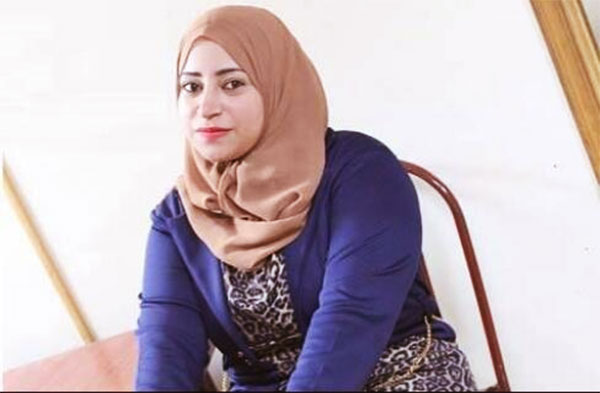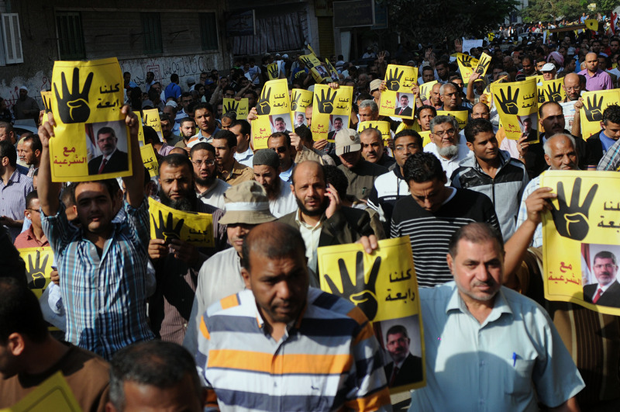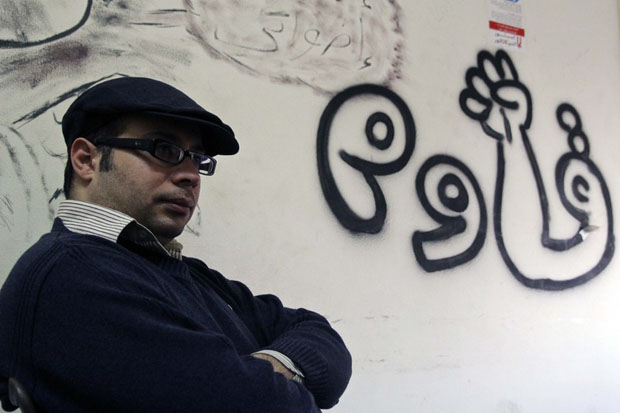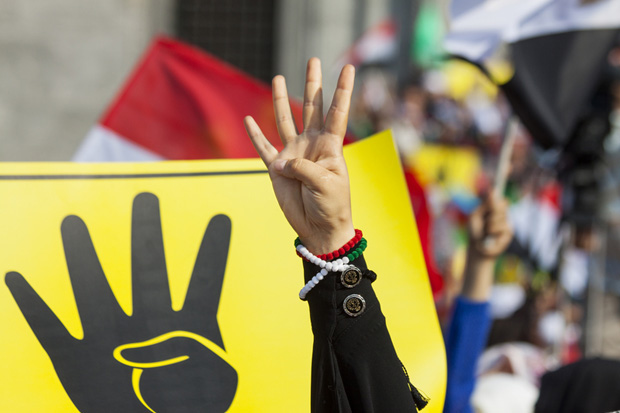24 Apr 2014 | Egypt, News and features, Politics and Society

Mayada Ashraf
While Egypt’s hugely controversial Al-Jazeera trial has been grabbing international attention, the recent death of 22-year-old reporter Mayada Ashraf – allegedly at the hands of the police – appears to have left more of a lasting impact on Egyptian journalists working amid the ongoing violence.
On Tuesday, Al-Jazeera “Marriot Cell” defendants again appeared in court to face charges of complicity in terrorism and “spreading false news.” Journalists at the hearing were temporarily booted out, while the judge in the chaotic session admitted he could not understand several pieces of audio evidence aired during the trial. The case has cemented in many people’s minds around the world the idea that Egypt is now a place of kangaroo courts; a dire environment for press freedoms, home to repressive anachronisms that everyone who remembers Tahrir Square in 2011 may be forgiven for thinking were a thing of the past. They’re not.
On March 28 Ashraf, a reporter with Al-Dostour, was gunned down while covering clashes between Muslim Brotherhood supporters and police in Ain Shams, eastern Cairo. Videos showed her corpse being rushed to safety as blood poured over her face. She died soon after.
Ashraf became the fifth reporter to die while reporting on clashes in Egypt since June 30, according to Committee to Protect Journalists figures. And while it may have been a month ago, the death of a young female journalist (who purportedly wrote last August that “Morsi is not worth dying for but Sisi is also not worth renouncing our humanity for”) has had a lasting impact in Egypt.
Press freedom campaigners have been collecting testimonies and eyewitness accounts from the day Ashraf died, an attempt to establish what really happened beyond the claims of the security apparatus.
Forensics officials suggested the shooter was from the Brotherhood, offering a series of exacting distances, heights and perspectives on where the gunman was when Ashraf was hit. The gunman was a few metres away from Ashraf, and probably standing on a car or pavement when she died, claimed senior forensics physician Hisham Abdel Hamid. Interior Minister Mohamed Ibrahim defended the role of security forces that day.
However Journalists Against Torture, a group aiming to build solidarity and offer help among journalists, has spoken to two eyewitnesses who contradict the official account of that day.
“As a journalist, you usually rely on the first eyewitnesses,” explains Journalists Against Torture’s Ashraf Abbas, tucked away in a corner of a café in Cairo’s Boursa district. “And two eyewitnesses said [the shot] came from the security forces.” One of those eyewitnesses, another journalist, was close to Ashraf when the bullet hit her head.
Abbas believes these testimonies carry more weight. “For us, this is more credible than what the Interior Ministry says…They rush into lies before they’ve had time for a proper investigation.” Mohamed Ibrahim’s denial came just two days after Ashraf was shot.
The state’s response, often in the face of contrary evidence, has been used before to absolve itself of any possible blame from a string of controversial deaths.
In November, Cairo University engineering student Mohamed Reda was fatally shot with cartouche (birdshot) as police moved in on a campus protest. The Interior Ministry denied firing anything other than tear gas, before video evidence explicitly disproved that claim. The government then blamed “Brotherhood students” for Reda’s death.
Forensics and ministry officials subsequently claimed the police did not use–or even possess–the rounds which killed Reda. The shooter must have been a Brotherhood student, they argued.
Mohsen Bahnasy is a lawyer who contributed to the investigation into killings during the November 2011 Mohamed Mahmoud Street clashes, events now seen as a case study in disproportionate, lethal force by the Egyptian police. Bahnasy told Index in November that four-millimeter and 8.5-millimeter birdshot found at Mohamed Mahmoud has since appeared in the corpses of students (like Reda) killed in the post-July crackdown – deaths that have been blamed on the Brotherhood.
“Now they have something to hang all their problems on,” Abbas claims, referring to the Brotherhood bogeyman theory used by the authorities to write off deaths, terrorism and even a recent outbreak of tribal violence which left almost 30 dead in Aswan in southern Egypt.
“The killing of Mayada Ashraf was a real wake-up call for the journalistic community. And it has certainly raised serious concerns about how the journalistic community is taking action to protect its own people,” says Aidan White, director of the London-based Ethical Journalism Network.
Al-Dostour editor Essam Nawabi resigned in protest against the death of his colleague. Photojournalists have also launched a series of brief strikes and demonstrations to demand better conditions and protections. This growing anger amongst Egypt’s media community has often reached the doors of the Journalists’ Syndicate, long accused of not doing enough to protect journalists.
Journalists have claimed the police are deliberately targeting them. During clashes between students and police at Cairo University two weeks ago which left one student dead, two journalists were also seriously injured: Khaled Hussein was shot in the chest with live ammunition, while Amr Abdel-Fattah received birdshot wounds. Another photojournalist, Amru Salahuddien, claimed police “intentionally” targeted journalists inside the university: “I was hiding behind a palm which they kept firing at for at least one minute,” he tweeted shortly afterwards.
“A lot of the anger that we’ve seen among rank-and-file journalists in Egypt, particularly younger rank-and-file journalists, is being aimed not just at the authorities (for their failure to provide protection), but also the Journalists’ Syndicate,” White says.
The syndicate has since agreed to donate 100 bulletproof vests and helmets, and promises field reporters will be safe in the future. But are small acts of solidarity by journalists going to change things? “The momentum comes and goes,” Abbas admits, drawing parallels with the fierce debate over press freedoms after “Black Wednesday” in 2005, when mobs sexually assaulted female protesters and journalists during protests. “Now there is momentum again, but we can’t depend on this…we have to make solid gains, pass laws and build something solid.”
Until then, journalists in Egypt are still at risk. For some, Mayada Ashraf’s death is a case study in how the state responds to violence it is accused of carrying out with disregard and impunity. White argues the response could easily be different.
“Was this a killing by groups supportive of the Muslim Brotherhood, or were these thugs working for the police?” he asks. “The only way to find that out is to have a proper investigation. That is what is required.”
Additional reporting by Abdalla Kamal
This article was originally posted on 24 April 2014 at indexoncensorhip.org
17 Mar 2014 | Egypt, Middle East and North Africa, News and features

Supporters of the Muslim Brotherhood and Egypt’s ousted President Mohammed Morsi (Image: Nameer Galal/Demotix)
Amid deep polarisation and a widening crackdown on dissent in Egypt, the country’s military-backed authorities have now taken their conflict with the outlawed Muslim Brotherhood to a new front — houses of worship.
Egypt’s mosques have become the new battleground in the country’s political standoff, with the authorities recently introducing a set of measures to control religious discourse and silence pro-Muslim Brotherhood clerics they accuse of “mobilising anti-military protests and inciting violence”.
The latest measures include forbidding prayers in small mosques that are not under state control, and restricting sermons to graduates of Al Azhar University — Sunni Islam’s most prestigious institution. In recent months, no fewer than 55,000 imams lacking such credentials, have been dismissed from their jobs.
Ministry of Religious Endowments officials defend the move, insisting it is “necessary to stop lay preachers from exploiting the pulpits to advance their political interests”. For decades, the country’s mosques and universities have been fertile ground for enrolment of Muslim Brotherhood recruits and the spread of the Islamist group’s ideology. The Muslim Brotherhood , which rose to power following former president Hosni Mubarak’s ouster in February 2011, was designated a terrorist organisation by authorities in December.
In another controversial move tightening the state’s grip on mosques across the country, the Ministry of Religious Endowments has unified the theme of the weekly mosque sermons preceding Friday noon prayers. Previously, Egypt’s imams or preachers were free to choose the topic of their weekly sermons but it is now the ministry that decides what the imams should preach to the millions of worshippers attending Friday prayers.
Since the measure came into effect on 31 January, the ministry has announced a different theme each week on its official website, addressing topics that affect the daily lives of millions of Egyptians. In recent weeks, preachers have tackled a broad range of issues including developing squatter areas, environmental pollution and the role of youth in the society. The ministry has also been handing out guidelines to preachers at mosques under its control, warning that violators “will face dismissal and prosecution”.
Despite the warnings, some preachers remain defiant, refusing to comply with the instruction. They say they are the ones who should decide what to tell their followers.
“I will not be dictated by the state,” said Khalaf Massoud who preaches at the Montazah Mosque in the working class neighbourhood of Imbaba, adding that his duty is to “obey God” not “those in power”.
Other preachers have also denounced the measure as “a restrictive procedure that stifles free speech and religious freedoms”. But not all preachers are against the measure and some have even welcomed it, perceiving it as necessary for unifying the country and defusing current political tensions.
In an interview broadcast on CCTV on Friday, Imam Yasser Khattab who preaches in several mosques, said: ” The Muslim Brotherhood manipulated people and spread Islamist fundamentalism through their mosques. They incited hatred and divided the society in the last three years. There should be a stand.”
Since the toppling of Muslim Brotherhood President Mohamed Morsi by military-backed protests in July, clashes sparked by heated debate between Muslim Brotherhood supporters and opponents have frequently occurred in and around mosques after Friday noon prayers.
With a limited number of monitors to supervise the religious discourse, it is difficult for the ministry to keep track of rebel preachers refusing to abide by the new rule. Last week, four imams were summoned for interrogation at the ministry after they had allegedly called for anti-government protests during their sermons. The risk of criminal prosecution however, has failed to deter preachers like Massoud who vows to continue “to criticise any wrongdoings as people turn to me for religious guidance”.
The latest move by Egypt’s Ministry of Religious Endowments is part of the widening crackdown on Islamists and comes hot on the heels of other repressive measures taken by the authorities to curb dissent. Since the ouster of Islamist President Mohamed Morsi, the regime that replaced him has closed down TV channels and publications with links to the Muslim Brotherhood. It has also arrested and detained thousands of the group’s supporters while security forces have killed at least 1,400 Brotherhood loyalists. But with inadequate funding and insufficient manpower, it will be a daunting task for the ministry to exercise control over the country’s estimated 130,000 mosques — 10,000 of which are already independent of the state. Skeptics say it may be an impossible feat to undertake as the ministry’s resources are already stretched thin.
This article was posted on March 17, 2014 at indexoncensorship.org
7 Jan 2014 | Egypt, News and features

Head of the April 6 Youth Movement Ahmed Maher and two other activists were in December sentenced to three years in prison, among other things for “staging a protest rally without prior permission from the authorities” (Image: Roger Anis/Demotix)
After officially classifying the Muslim Brotherhood as a “terrorist organisation”, Egypt’s military-backed regime has in recent days, widened its crackdown on supporters of the Islamist group.
But the Egyptian authorities’ heavy clampdown on dissent has also increasingly targeted non-Islamists — including secular revolutionary activists who took part in the June 30 military-backed protests that toppled Islamist President Mohamed Morsi.
On Friday, seventeen Islamist “anti-coup” protesters were killed and scores of others were injured in clashes with security forces nationwide, Egypt’s Health Ministry said. Meanwhile, three journalists working for the Al Jazeera English channel remain in custody pending investigations on charges of “being linked to a terrorist organisation and spreading false news that harms national security.” Egyptian officials have accused the Qatari-based Al Jazeera network of backing the Muslim Brotherhood.
Three prominent revolutionary activists also languish behind bars after being handed down three-year jail sentences in December. Ahmed Maher, Founder/Head of the April 6 Youth Movement (one of the two main groups that planned and organised the 2011 mass uprising), Mohamed Adel, a member of the April 6 group and activist Ahmed Douma have been accused of “thuggery, assaulting police officers and staging a protest rally without prior permission from the authorities.” In November, the Egyptian government passed a controversial law criminalising protests without permission from the Interior Ministry.
The activists are on hunger strike to protest their imprisonment on what they — and various rights organisations — have described as “politically-motivated” charges. They are also protesting the harsh prison conditions and their “maltreatment” at the hands of prison guards and inmates.
On Saturday, the Free Alaa Facebook group slammed the “rights abuses” the detainees face at Torah high security prison where they are being held. According to a statement posted on the group’s Facebook page, the detainees are being held in solitary confinement for 22 hours a day and are being denied access to all forms of communication including with family members. “It has become clear to the detainees and their families that the Interior Ministry is not solely responsible for the rights violations. The Public Prosecutor’s Office and the Prison Administration are also implicated,” the statement said.
Other activists too are paying a high price for their criticism of the regime. Political activist Alaa Abdel Fattah, a symbol of the January 2011 Revolution, his sister Mona Seif (Founder of the No To Military Trials movement) and ten other defendants on Sunday received a one year suspended jail sentence for allegedly “attacking the campaign headquarters of former presidential candidate Ahmed Shafik in May 2012”. Both Alaa and Mona have denied the allegation. Before appearing in court on Sunday, Seif told the independent Al Shorouk newspaper that there was no evidence to incriminate her — or her brother — in the case. Alaa will remain in jail on other charges including for allegedly “organising and taking part in an unauthorised November anti-military protest rally”. Alaa has denied organising the protest. His imprisonment, meanwhile, has provoked an outcry from rights campaigners who believe the activist has been jailed “for his oft-scathing criticism of the abuses committed by the security forces.”
Meanwhile, other revolutionary activists have decried what they describe as “efforts by the current regime to defame them”. Asmaa Mahfouz, an internet activist who played a key role in the mass mobilisation of Egyptians that led to the January 2011 Revolution and former MP and activist Mustafa El Naggar have filed lawsuits against TV talk show host Abdel Rahim Ali (widely believed to have close links with the country’s various security agencies) after he aired what he claimed were taped telephone conversations by the activists. The leaked conversations, broadcast last week on TV show “The Black Box” on the privately-owned satellite channel Al Qahira al Nas, provoked an outcry from Egyptian rights organisations. A joint statement released by several rights groups denounced the leakages as “a breach of privacy and a serious violation of basic individual and civil liberties.” The statement also called on the authorities to bring those responsible for eavesdropping, taping and broadcasting the telephone conversations to justice. Ali has remained defiant however, subsequently vowing to air many more taped telephone calls which he claimed would “expose those implicated in a foreign plot to destroy the country.”
The leaked telephone conversations focused on secret documents seized by the activists in question on March 4, 2011. That was the day hundreds of protesters stormed the offices of the much-detested State Security Service, the SSS, to acquire documents they hoped “would expose the crimes of the security agency against Egyptians during the Mubarak era”. The SSS was dismantled shortly after the raids and was renamed “National Security.” The military rulers who replaced Hosni Mubarak immediately after the January 2011 mass uprising, had vowed at the time that the new security authority would be solely concerned with dealing with “national security issues” and would not repeat the practices of the old SSS (including mass surveillance and spying on citizens). As a result of the recently televised leaks, several “private citizens” have filed lawsuits against Mahfouz and Israa Abdel Fattah (another prominent internet activist and former member of the April Six group) accusing them of “inciting the raids on the SSS Headquarters”.
In comments posted on his Facebook page, former lawmaker El Naggar said the leaked conversations were a form of revenge by the state against revolutionary activists. He also described them as a means of “character assassination to defame him and other political opponents of the military-backed regime.”
Meanwhile, an online statement released on January 3 by Amnesty International urged the authorities in Egypt to “halt their crackdown on vocal critics of the regime — including the use of politically-motivated trials to punish dissidents.”
One activist who chose to remain anonymous has best described the heavy-handed, repressive measures used by the state to intimidate and silence critics as “counter-revolutionary practices” which he said were designed “to crush dissent and wipe out all traces of the January 2011 Revolution.”
“But the critics will neither be intimidated nor silenced,” he said. He added that “the current regime tends to forget that the fear is gone… There is no going back to pre-January 2011.”
This article was published on 7 Jan 2014 at indexoncensorship.org
27 Dec 2013 | News and features
 In a new sign that Egypt’s military-backed regime is widening its crackdown on dissent, three prominent activists and symbols of the January 2011 Revolution were sentenced to 3-year jail terms by a Cairo court this week.The court also ordered the activists to pay a fine of LE 50,000 each .The case has fuelled fears of increased government repression in a country wracked by violence since the toppling of Islamist President Mohamed Morsi by military-backed protests in July.
In a new sign that Egypt’s military-backed regime is widening its crackdown on dissent, three prominent activists and symbols of the January 2011 Revolution were sentenced to 3-year jail terms by a Cairo court this week.The court also ordered the activists to pay a fine of LE 50,000 each .The case has fuelled fears of increased government repression in a country wracked by violence since the toppling of Islamist President Mohamed Morsi by military-backed protests in July.
On Thursday, founder of the April 6 Youth Movement Ahmed Maher, member of the group’s political bureau Mohamed Adel and political activist Ahmed Douma began a hunger strike to protest “harsh treatment” at Cairo’s Torah Prison where they are being held. The pro-democracy activists were among 51 activists detained last month after organizing a demonstration to protest a controversial new law that the government claims will “regulate protests”. They were accused of allegedly “assaulting police officers, thuggery and organizing a protest without obtaining a permit from the authorities.” Rights groups have condemned the jail sentences, expressing concerns that the Egyptian authorities were “reversing the hard-earned gains of free speech and assembly acquired following the January 2011 uprising that toppled Hosni Mubarak.
In a statement posted on the April 6 website, the activists denounced the “inhumane conditions” they have endured in prison . They also complained of maltreatment and abuse by fellow inmates.
The activists’ statement coincided with a government announcement that the Muslim Brotherhood had been declared a “terrorist organisation”–a move signaling further marginalisation of the Islamist group in the bitterly polarized country .The government decision came a day after a fatal suicide bombing that targeted the Security Directorate in the Nile Delta city of Mansoura. At least 12 people were killed and 130 others were wounded in the attack for which a Jihadi group – Ansar Beit al Maqdis–later claimed responsibility. Despite the Muslim Brotherhood’s denunciation of the terror attack on their official website Ikhwanweb, the government announced plans to criminalize the group’s activities and freeze its funds–a move the analysts feared would lead to greater radicalization of the group and plunge the country into civil strife.
General Coordinator of the April 6 Youth Movement, Amr Aly criticised the government decision saying that ‘branding the Brotherhood a terrorist organisation would not halt the attacks but would end hopes for stability, plunging the country in a state of chaos.”
As Egyptians were still reeling from the shock of Tuesday’s deadly bombing in Mansoura, news broke of a second blast in Cairo’s residential neighborhood of Nasr City on Thursday . The latest explosion–caused by a homemade bomb–injured five passengers on a bus.raising fears of a fresh spate of attacks ahead of a popular referendum on the new constitution scheduled for mid January.
Hours after Thursday’s attack, 16 Muslim Brotherhood supporters were arrested in the Nile Delta province of Sharkiya on charges of “promoting the ideology of the Muslim Brotherhood group, distributing leaflets, and inciting violence against the army and police.” Egypt’s privately-owned TV channel CBC meanwhile, announced the numbers for a new Hotline, urging citizens to report people they suspect of having links to the “terrorist group.”
The recent repressive measures have been described by analysts as a “dramatic escalation in a long-running feud between Egypt’s security agencies and the Islamist group intended to paralyse the latter and block any space for the Brotherhood in the political process.” But with the crackdown now expanding to target secular revolutionary activists, many are concerned that Egypt’s “democratic transition” may have taken a wrong turn, leaving the country on the brink of a civil war that may tear it apart.




 In a new sign that Egypt’s military-backed regime is widening its crackdown on dissent, three prominent activists and symbols of the January 2011 Revolution were sentenced to 3-year jail terms by a Cairo court this week.The court also ordered the activists to pay a fine of LE 50,000 each .The case has fuelled fears of increased government repression in a country wracked by violence since the toppling of Islamist President Mohamed Morsi by military-backed protests in July.
In a new sign that Egypt’s military-backed regime is widening its crackdown on dissent, three prominent activists and symbols of the January 2011 Revolution were sentenced to 3-year jail terms by a Cairo court this week.The court also ordered the activists to pay a fine of LE 50,000 each .The case has fuelled fears of increased government repression in a country wracked by violence since the toppling of Islamist President Mohamed Morsi by military-backed protests in July.